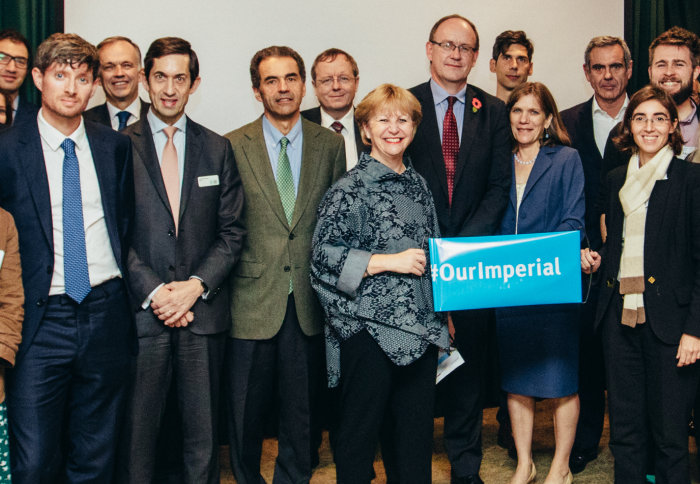Imperial and Portugal's FCT celebrate science partnership with alumni in Lisbon

Imperial College London and the Portuguese FCT celebrated a new partnership in science and research at an alumni reception in Lisbon.
Dozens of Imperial alumni based in Portugal joined academics, the Portuguese Science Minister and the UK Ambassador to Portugal to celebrate the new partnership.
The agreement between Imperial and the Foundation for Science and Technology (FCT) - is initially funded for two years and will help fund mobility of researchers and workshops.
The partnership will help strengthen collaborations in areas such as cancer research, infectious diseases, oceans and maritime research, climate change, nanotechnology, space and data science.

Vice President (International) Maggie Dallman hosted the event and said: "We’ve been working with the Minister and the FCT to develop this wonderful funding opportunity to bring scientists, engineers and medics to work with peers in Portuguese universities."

The Portuguese Science Minister and Imperial alum, Manuel Heitor, (Mechanical Engineering PhD, 1985), said: "I believe science needs politics and politics needs science.
"We want to show to Europe that Imperial and Portugal will become a strong tie and we will make better use of science and entrepreneurs.
"I hope through more science applications we can build better ties throughout Europe."

The UK Ambassador to Portugal, Chris Sainty, said: "In the UK we are truly blessed to have strong university sector and global reputation for quality of our science and research.
"Our universities act as a magnet for overseas talent and I can’t think of a better example of that than the links we're celebrating today.
"Imperial sits right at the top of the pile in universities in the UK. I want to see British and Portuguese researchers working side by side on the great challenges of our time."

José Paulo Esperança, Vice-President (FCT): "It’s truly amazing to see so many Portuguese working at Imperial and alumni from Imperial working with us.
"This new partnership is very important in the context of the relationship between the UK and Portugal in general.
"Imperial one of largest and most influential universities in this regard."
The Director General of the European Space Agency, Jan Wörner, spoke to urge participation in the ESA-Labs project, and Chiara Manfletti from the Portuguese Space Agency also spoke about the need for greater collaboration.
Professor Francisco Veloso, Dean of Imperial College Business School highlighted that there are many Portuguese staff at the Business School.

Dr Robin Carhart-Harris, Head of the recently launched Centre for Psychedelic Research, then presented his work into psychedelic drugs.
He talked about his research into the receptor serotonin (5-HT) which could facilitate greater plasticity of the brain. Accumulating evidence suggests that psychedelics with psychotherapy can be an effective treatment for certain mental illnesses.
Dr Carhart-Harris said: “This is a different approach to treating mental illness than we’re used to.
"This is a more holistic model that is about giving a drug to create a state of plasticity and using that window of opportunity to incite insight, emotional release, self-understanding, which seems to be very beneficial. It’s a synergy between drug and therapy."
Web Summit
While in Lisbon, Professor Dallman spoke at Web Summit, one of the world’s largest tech conferences.
Professor Dallman spoke on the Future Societies stage, about Imperial's new White City Campus.

Professor Dallman said: "The ethos of this developing campus is about mixing things up.
"Whether it’s scientists working with engineers, local residents with students, corporates with patients or doctors with artists, the really important thing is we’re providing a space where inclusive innovation can flourish and no one is left behind.”
Other speakers at Web Summit included former Prime Minister Tony Blair, Brexit negotiator Michel Barnier, Blackstone CEO Stephen Schwarzman, Edward Snowden and Wikipedia CEO Katherine Maher.
Imperial and Portugal

Imperial has more than 1,000 Portuguese alumni and academics joint-publish more than 125 research papers every year.
Some of those attending the alumni event included Dr Ana Barbosa-Povoa (Chemical Engineering PhD, 1994) who has special memories of her time at Imperial.
Dr Barbosa-Povoa said: “It was one of the best periods of my life, I met many different people, who I am still in contact with.
“It was really a basis to boost my career. I had the opportunity to make a huge number of connections and from there it was easy to progress in my career.”

Prof Jorge Martins de Carvalho (Computing and control PhD, 1977) said: “I have fond memories of my time at Imperial, the atmosphere, the stimulating environment, the quality of my supervisors and the staff in my department.
"London itself is a breeding ground of innovation, and the heartbeat of the world.
Dr Silvia Colucci (Biochemistry, 2013) is from Luxembourg and was attending the Web Summit. Dr Colucci, who also met her husband at the College, said: “It was a dream come true to go to Imperial, I always wanted to go there and study in London. It’s given me the best preparation for the real world.
"It always has a really great reputation and people recognise the value of the studies."
__
Video courtesy of WebSummit
Article text (excluding photos or graphics) © Imperial College London.
Photos and graphics subject to third party copyright used with permission or © Imperial College London.
Reporter
Stephen Johns
Communications Division
